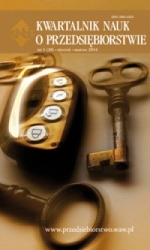Licensure, Ethics, Welfare of the Public and Uberization of Services
Main Article Content
Abstract
Artykuł zawiera analizę problemu licencji zawodowych, na przykładzie rynku amerykańskiego. Z jednej strony, licencja powinna być gwarancją odpowiedniej wiedzy i umiejętności wykonawcy usług, ale z drugiej jest problem, jakie kryteria stosować, aby określić odpowiedni ich poziom. Zbyt wysokie wymagania wobec osób świadczących dane usługi mogą prowadzić do ograniczenia konkurencji na rynku pracy, a tym samym do wzrostu cen. Z kolei zbyt liberalne podejście do wydawania licencji może zagrażać dobru publicznemu. Autor omawia ten dylemat w oparciu o doświadczenia różnych rozwiązań stanowych i ich skutków dla rynku.
Downloads
Article Details
The author of the article declares that the submitted article does not infringe the copyrights of third parties. The author agrees to subject the article to the review procedure and to make editorial changes. The author transfers, free of charge, to SGH Publishing House the author's economic rights to the work in the fields of exploitation listed in the Article 50 of the Act of 4 February 1994 on Copyright and Related Rights – provided that the work has been accepted for publication and published.
SGH Publishing House holds economic copyrights to all content of the journal. Placing the text of the article in a repository, on the author's home page or on any other page is allowed as long as it does not involve obtaining economic benefits, and the text will be provided with source information (including the title, year, number and internet address of the journal).
References
2. Berry F.S. [1986], State Regulation of Occupations and Professions, The Book of the States, 1986-7,Lexington, Council of State Governments, p. 379-383.
3. BPOA [2015], Bureau of Professional and Occupational Affairs, http://www.dos.pa.gov/ProfessionalLicensing/BoardsCommissions/Pages/default.aspx#.VP3HoPnF_nh, dostęp 12/12/2015.
4. Brannon J.A., et al. [2012], Making the Case for Uniformity in Professional State Licensure Requirements,“International Journal of Telerehabilitation”, Vol. 4, No. 1, Spring.
5. Brous E. [2012], Professional Licensure Protection Strategies, AJN,Vol. 112., No. 12, December.
6. Carpenter Il., et al. [2012], License to Work. A National Study of Burdens from Occupational Licensing,Arlington.,VA, Institute of Justice.
7. Chrzanowski I.H. [2014], Business Ethics and Social Responsibility in the Transition Economies,„Kwartalnik Nauk o Przedsiębiorstwie”, nr 3(32), p. 27-37.
8. Dreyfus H., Dreyfus S. [1991], Towards a Phenomenology of Ethical Expertise, “Humanity Studies”,Vol. 14, p. 229-250.
9. Gapiński A. [n/p], Factors Affecting Decision Making of Licensure Boards: Another Look, not published.
10. Jacobson D. [2005], Seeing by Feeling: Virtues, Skills, and Moral Perception, “Ethical Theory andMoral Practice”, Vol. 8, Spring, p. 387-409.
11. Kleiner M.M. [2015], Reforming Occupational Licensing Policies, The Hamilton Project, BrookingInstitution Discussion Paper-01, January.
12. Kleiner M.M., Kudrie T.R. [1992], Do Tougher Licensing Provisions Limit Occupational Entry? TheCase of Dentistry, Working Paper, No. 3984, February, National Bureau of Economic Research,Cambridge, Massachusetts.
13. Koumenta M., et al. [ 2014], Occupational Regulation in the EU and UK: Prevalence and LabourMarket Impacts, Final Report, Dept. for Business and Management, Queen Mary University ofLondon, London, June.
14. Manjoo F. [2015], Uber’s Business Model Could Change Your Work, “The New York Times”, BusinessDay, January 29.
15. Michels J. [2013], Professional Licensure – It’s Important, IE Industrial Engineer. Member Forum,August.
16. NSPE [2015], The National Society of Professional Engineers, http://www.nspe.org/resources/ethics/code-ethics, dostęp 10/11/2015.
17. Porter E. [2015], Job Licenses in Spotlight as Uber Rises, “The New York Times”, Business Day, January28.
18. Professional Licensing [2015], Pennsylvania Department of State, http://www.portal.state.pa.us/portal/server.pt/community/licensing/12483, January, dostęp 10/12/2015.
19. Schneider S. [1987], Influences on State Professional Licensure Policy, “Public Administration Review”,Vol. 47, No. 6, Nov.-Dec., pp. 479-484.
20. SEC [2015], The Securities and Exchange Commissions, http://www.sec.gov/about/laws.shtml,dostęp 10/10/2015.
21. Smith J.H., Harper P.M., Burgess R.A. (eds) [2008], Engineering Ethics. Concepts, Viewpoints, Cases,and Codes, National Institute for Engineering Ethics, Texas Tech University, Lubbock, 2nd Edition.
22. Stichter M. [2011], Virtues, Skills, and Right Action, “Ethic Theory Moral Practice”, Vol. 14, p. 73-86.
23. Thornton M.A. [2012], Professional Licensure For Software Engineers: An Update, “Education”,September-October, co-published by the IEEE and the AIP.

